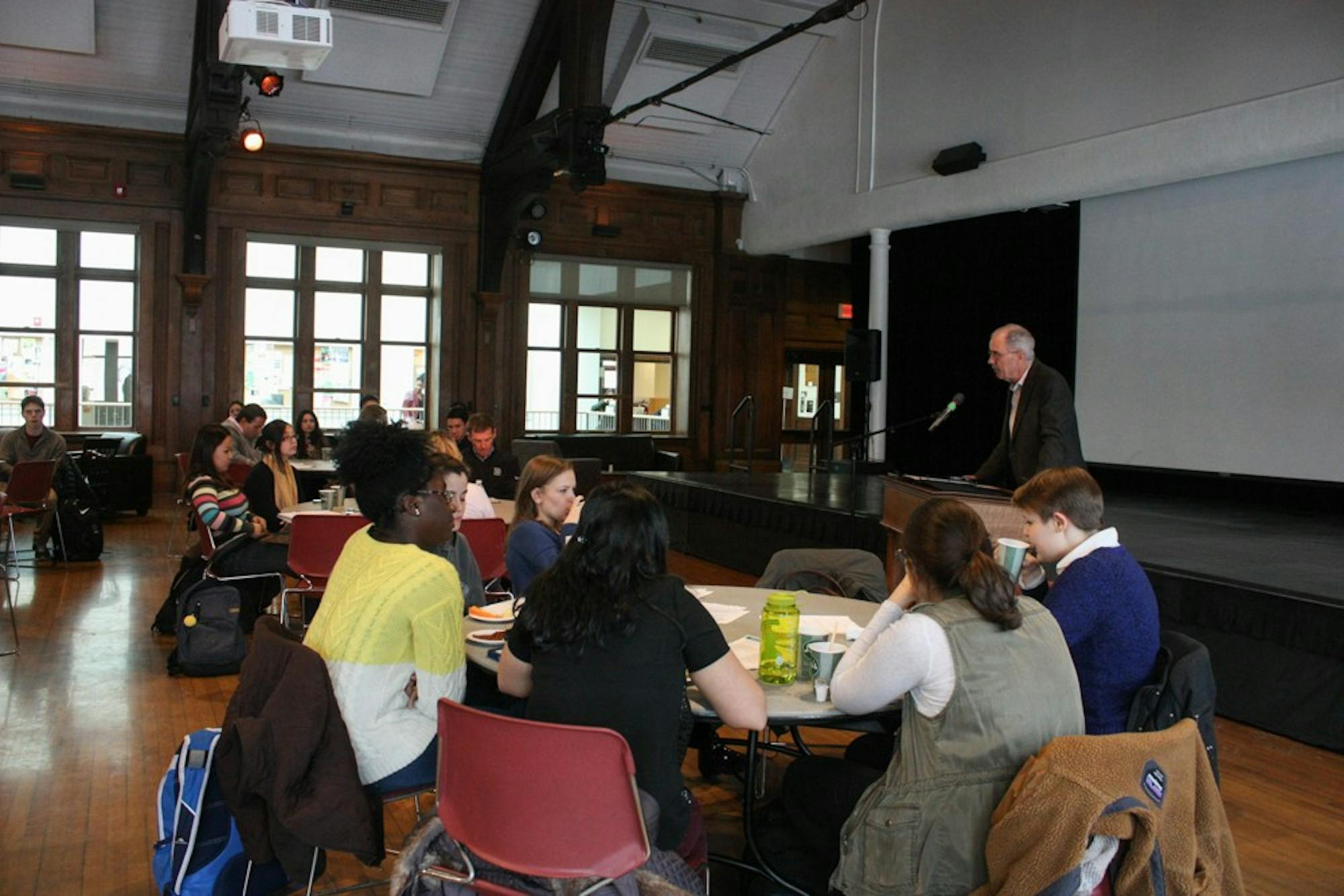Yesterday’s fifth annual Symposium on Sexual Assault, held in Collis Common Ground and hosted by the Student and Presidential Committee on Sexual Assault, aimed to gather feedback on the College’s new sexual violence prevention and education program. The four-year sexual assault education program, implemented under College President Phil Hanlon’s “Moving Dartmouth Forward” initiative, is slated to begin in the fall.
About 60 students, administrators and faculty attended the event and participated in small group discussions to provide commentary.
“We felt like this was a good opportunity for getting community and student feedback,” committee member and organizer Katherine McAvoy ’17 said. “A lot of times the people who are often involved in this work have the same ideas, so this symposium tends to have a wider reach.”
Assistant director for violence prevention Amanda Childress presented on the ideology and progress of the College’s new four-year sexual prevention program following opening remarks from Hanlon.
Childress said the United States Naval Academy’s sexual education program — the only other four-year prevention program at a college — has served as model for Dartmouth’s pilot program. Yet while the Naval Academy’s program provided an example of a long-term sexual education curriculum, the committees developing Dartmouth’s new four-year program have taken into account the structural differences between the two schools. Students at the Naval Academy are always on-campus and share a similar interest of joining the military after graduation, which differs from the myriad D-Plans and post-graduation plans held by Dartmouth students. In addition, the Naval Academy’s program is very structured and uniform, which will not work at Dartmouth due to the diversity of experiences at the College, Childress said.
She added that the College does hope to emulate the Naval Academy’s idea of culminating moments, which will allow students to reflect on their engagement with the program throughout their years on campus.
Childress outlined four specific behavioral outcomes student will develop through the new program: increasing the use and referrals of on-campus sexual assault resources available to student, such as WISE and counseling; teaching students to have more proactive consent and communication before sexual activity; improving communication with minority groups on the unique challenges they face in considering sexual health; and increasing Dartmouth Bystander Intervention training.
Childress mentioned that while sexual assault prevention is emphasized during freshman year through the required pre-enrollment online alcohol course, orientation presentations and floor meetings, a lack of required engagement exists during the rest of students’ time on campus.
In addition, while the four-year program remains in its developing stages, Childress said the program is progressing toward completion through several working groups and the input of students.
After the presentation, participants broke out into smaller, round-table discussions on the perception of sexual violence on campus, the ways in which prevention has changed over time, how sexual violence impacted their communities at the College, possible gaps in resources provided at Dartmouth and other ways to improve the College’s prevention of sexual violence.
Veronique Davis ’15 said she attended the event because sexual assault has impacted her friends.
“I feel like we talked about a lot of ways to move forward in terms of action which has been an issue in the past,” she said. “I think the small group discussions are really useful in terms of getting really good ideas out.”
She also mentioned that she was surprised by the turnout, as she did not expect so many people to be thinking about how sexual violence impacts both themselves and others.
McAvoy said that the event mainly tried to highlight how sexual violence impacts the entire community and the different communities present at Dartmouth to ensure that resources are accessible to everybody.
Feedback from the symposium will inform the SPCSA recommendations released in the fall. The feedback will be brought back to the SPCSA committee leaders by the end of next week.
“There were a lot of new ideas and I’m excited to see what came up at the other tables,” McAvoy said.
Zachary Benjamin contributed reporting.
Amanda Zhou is a junior at Dartmouth College originally from Brookline, Massachusetts. She’s previously been the associate managing editor, health and wellness beat writer at the Dartmouth and interned at the Pittsburgh Post-Gazette this Fall. She is pursuing a major in quantitative social science and a minor in public policy. At college, she edits the campus newspaper, serves on the campus EMS squad and lives in the sustainable living center. After graduation, she is interested in a career in journalism or data analysis. In her spare time, she can be found running, cooking or trying to rock climb.




